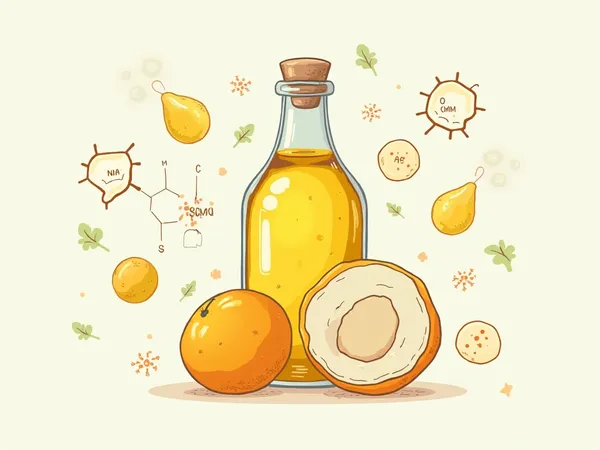
Ready to Start Your Wellness Journey?
Become a Herbalife Preferred Member and enjoy exclusive discounts of up to 25% on all products.
BECOME A PREFERRED MEMBERAlpha-tocopherol: Essential Guide to Vitamin E Benefits
Introduction
Alpha-tocopherol, commonly known as vitamin E, is a fat-soluble nutrient recognized for its role as an antioxidant and its importance in human nutrition. Found naturally in various foods and available as a supplement, alpha-tocopherol helps protect cell membranes from oxidative damage and supports overall health when consumed at recommended levels.
Role in the Body
Alpha-tocopherol functions primarily as an antioxidant, helping to protect polyunsaturated fatty acids in cell membranes from oxidative damage. This activity contributes to the maintenance of normal cellular structure and function.
Specific Functions
• Protects cell membranes: Alpha-tocopherol localizes within lipid bilayers and helps prevent lipid peroxidation (National Institutes of Health, Office of Dietary Supplements).
• Supports immune function: Clinical studies have shown that adequate vitamin E intake is associated with maintenance of normal immune responses, particularly in older adults (Meydani et al., 2004).
• Contributes to skin health: As an antioxidant, alpha-tocopherol can help protect skin lipids from oxidative damage and support normal skin barrier function (European Food Safety Authority, 2015).
Effects of Deficiency
Inadequate alpha-tocopherol intake or absorption can lead to deficiency, especially in individuals with fat‐malabsorption disorders. Recognized signs and symptoms include:
• Neurological issues: Deficiency can result in peripheral neuropathy, ataxia, and muscle weakness arising from impaired neuronal function (Institute of Medicine, 2000).
• Hemolytic anemia: Increased susceptibility of red blood cells to oxidative damage may lead to hemolysis (Institute of Medicine, 2000).
Dietary Sources
Alpha-tocopherol is present in a variety of foods. Including these items in your diet can help meet daily recommended intakes.
Best Food Sources
• Almonds (1 oz provides about 7.3 mg, or 49% of the Daily Value)
• Sunflower seeds (1 oz provides about 7.4 mg, or 49% of the Daily Value)
• Hazelnuts (1 oz provides about 4.3 mg, or 29% of the Daily Value)
• Peanut butter (2 tbsp provides about 2.9 mg, or 19% of the Daily Value)
• Spinach (1 cup cooked provides about 3.7 mg, or 25% of the Daily Value)
• Avocado (1 medium fruit provides about 2.7 mg, or 18% of the Daily Value)
Supplementation
While most individuals can achieve recommended intakes through diet, supplementation may be appropriate for those at risk of deficiency:
• Individuals with fat‐malabsorption disorders (e.g., cystic fibrosis, Crohn’s disease).
• Persons who have undergone gastrointestinal surgery affecting fat absorption.
• Individuals advised by healthcare professionals to correct or prevent deficiency (National Institutes of Health, Office of Dietary Supplements).
Health Considerations
When consumed at recommended levels, alpha-tocopherol contributes to antioxidant protection of cells. Excessive supplemental intake (above the Tolerable Upper Intake Level of 1,000 mg/day for adults) may interfere with blood clotting and should be avoided unless under medical supervision (Institute of Medicine, 2000).
Daily Requirements
Recommended daily intakes of alpha-tocopherol, expressed as milligrams of alpha-tocopherol equivalents (mg α-TE), are as follows (Institute of Medicine, 2000):
• Infants 0–6 months: 4 mg/day
• Infants 7–12 months: 5 mg/day
• Children 1–3 years: 6 mg/day
• Children 4–8 years: 7 mg/day
• Children 9–13 years: 11 mg/day
• Adolescent males and adult men: 15 mg/day
• Adolescent females and adult women: 15 mg/day
• Pregnant women: 15 mg/day
• Lactating women: 19 mg/day
Tips for Incorporation
Incorporating alpha-tocopherol–rich foods into your meals can be straightforward:
• Sprinkle mixed nuts over oatmeal or yogurt.
• Use extra-virgin olive oil on salads and vegetables.
• Add avocado slices to sandwiches, salads, or smoothies.
• Blend leafy greens (spinach or kale) into smoothies.
• Snack on sunflower seeds or mix them into trail mixes.
• Choose fortified cereals or plant-based milks if dietary sources are limited.
Conclusion and Call to Action
Alpha-tocopherol plays a key role in protecting cell membranes from oxidative damage and supporting normal immune and skin functions. Most people can meet their needs through a balanced diet that includes nuts, seeds, leafy greens, and vegetable oils. Before considering high-dose supplementation, consult a healthcare professional to assess individual requirements and avoid potential adverse effects.
Disclaimer: This article is for informational purposes only and is not intended as medical advice. Consult a qualified healthcare provider before making changes to your diet or beginning any supplementation.
Ready to Start Your Wellness Journey?
Become a Herbalife Preferred Member and enjoy exclusive discounts of up to 25% on all products.
BECOME A PREFERRED MEMBER